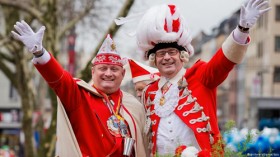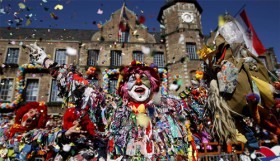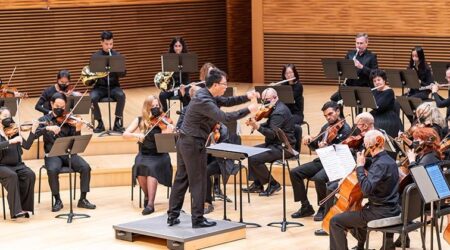The Colossal Cologne Carnival
Cologne is truly a unique city in Germany – so unique that those who call Cologne home when asked where they’re from while traveling will respond, ‘’I’m from Cologne,’’ rather than saying that they are from Germany. In many ways, I understand because I realized recently that when people in Europe ask me what country I come from, my answer […]
Cologne is truly a unique city in Germany – so unique that those who call Cologne home when asked where they’re from while traveling will respond, ‘’I’m from Cologne,’’ rather than saying that they are from Germany. In many ways, I understand because I realized recently that when people in Europe ask me what country I come from, my answer is always ‘’California’’ rather than ‘’the United States.’’ Cologne can be compared to California is many ways: both gay capitals, friendly, open, known for free-thinking inhabitants, who know how party.
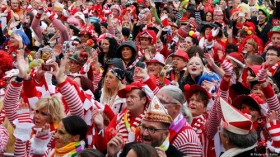 Starting every Thursday night until the wee hours of Sunday morning, Cologners celebrate the end of the week by barhopping, drinking, and not caring about deadlines. This was already something new for me when I compared the general lifestyles of people in Cologne to people in the south of Germany, such as in Munich and Stuttgart. But then came along the start of Carnival and a completely unexpected side of Cologne revealed itself.
Starting every Thursday night until the wee hours of Sunday morning, Cologners celebrate the end of the week by barhopping, drinking, and not caring about deadlines. This was already something new for me when I compared the general lifestyles of people in Cologne to people in the south of Germany, such as in Munich and Stuttgart. But then came along the start of Carnival and a completely unexpected side of Cologne revealed itself.
Being a foreigner I am often asked how long I’ve been in Germany and then whether I’ve ever attended Carnival. When I explain that I have not, the peevish looks I then receive hint that I am in for a surprise.
Maybe it’s because I’m American, or maybe I’m just a little immature for my age, but I still look forward to Halloween because I enjoy the creative process involved in dressing up in an original costume. This year was my first year experiencing Halloween in Germany and after spending the last six years in Halloween-deprived France I must admit that I was eagerly counting down the days to Halloween in Cologne. I saw attempts at celebrating Halloween in storefronts and porches adorning Jack-o-Lanterns. However, when the 31st of October rolled around, I found myself disappointed.
People definitely drank and partied as they are accustomed to doing every weekend anyway, but other than that, not too many people were celebrating or wearing costumes. Those wearing costumes were by no means original. So I asked around, trying to understand why Halloween had been so heavily marketed just to fizzle out in the end. The unanimous response was, ‘’We are waiting for Carnival.’’
I had heard stories of the mischievous Carnival, but couldn’t really wrap my head around normally reserved Germans behaving that way. Carnival season officially begins at 11:11 on November 11th of every year. Then it takes a break for the Christmas and New Year period before starting back up in the New Year. Carnival season ends in February, going out with a bang by indulging in a week-long street festival. However, no one really prepared me for the start of Carnival. Everyone told me to simply wait until the final celebration in February.
Then, on November 11, I was surprised to see people as early as 7:30 in the morning already in full costume and drinking beer. I found out later that this was in preparation for the start of the Carnival season which was to be held at exactly 11:11. People gathered on the street of Cologne en masse, adorning mostly comical costumes such as bears, ducks, kings, queens, rabbits, and overall proudly wearing the city colors of Cologne – red and white. By three in the afternoon, people were well out of their minds as many of the younger participants and tourists drank beer after beer without food, water, or breaks between servings. They were loud, they were clumsy, and they were daring.
Naturally, people were sick, so pedestrians had to perform a sort of ‘’avoid the vomit’’ waltz while dodging everything from fighting couples, to copulating couples, and every obliquely held plastic beer cup threatening to become a permanent part of your costume at every carefully negotiated maneuver. The day wore on and so did the inhabitants of Cologne, stopping only when the sun started to rise the next day.
Bars, clubs, and the streets were packed with disguised people. Alongside participants, the streets were littered with food and beverage trucks and copious amounts of police officers and paramedics. During the day, there were live bands playing traditional Carnival music throughout the city. The music is my one Carnival complaint – the residents seemed to cherish it, though, which leads me to believe that it must be forced upon you for about two decades from infancy before your brain surrenders. It’s basically slow, cheesy folk music that all sounds the same. The music aside, Carnival was a good experience which made me realize that the Germans had good reason not to care so much about Halloween. Why would they, when they have a whole season of Carnival?
My first thought early the next day when I headed off to work was, ‘’Am I the sole survivor of an apocalypse?’’ The city was literally dead-silent with only the sound of the tram and the movement of leaves and trash as it blazed through the otherwise empty streets. The ground was so full of trash that I couldn’t see anything else. I had to carefully make my way through the labyrinth of temporary stands, garbage, discarded costume pieces, turned over bicycles, and yes, even a turned over vehicle.
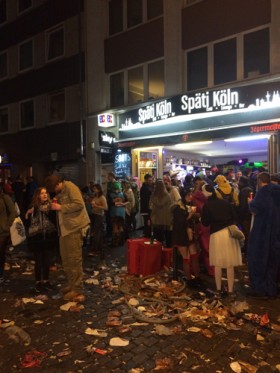
The next day I inquired about future Carnival celebrations and was informed that what went down on November 11 was mere child’s play compared to the week-long street celebration in February. The costumes are far more elaborate, with participants preparing their costumes as long as seven months in advance. The streets will be fuller, every main street will be completely blocked off to vehicles, the trams and undergrounds won’t all run, and people will drink more beer. My curiosity has been piqued and I look forward to February’s Carnival with a mixture of anticipation and fear.
Jacqueline Perrier-Gillette is currently a resident of Paris, France, where she lives with her husband. Together the two of them operate their small translation company, giving Jacqueline the opportunity to observe the French and their culture up close. She is an avid reader, writer, and student of foreign languages.
By Jacqueline Perrier-Gillette


